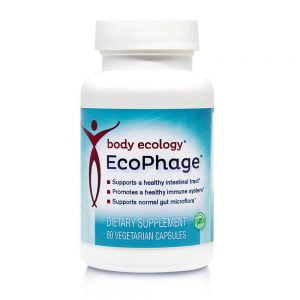
Is it really necessary to take a multivitamin on the Carnivore Diet?
You’ve probably heard of this rather restrictive diet by now. All animal proteins, including fish and seafood, beef, pork, lamb, bison, veal, bone broth, and organ meats (brain, kidney, liver, etc.) can be eaten. Cheeses and butter are consumed if desired — but absolutely no fruits and vegetables.
It’s called the Carnivore Diet. What are its benefits?
Is this the backup you need on the Carnivore Diet? Body Ecology’s EcoPhage is especially helpful in honing in on E. coli, which can contaminate meats and animal foods.
This high-protein, high-saturated fat, low-sugar diet has no “anti-nutrients” found in plant foods, like phytic acid, oxalates, salicylates, and lectins, so this may be why people often feel better and lose weight. The internet abounds with stories of the many people raving over how great they feel on the diet.
Another benefit of the Carnivore Diet is the avoidance of any processed foods and sugars found in fruits and vegetables.
So, what’s lacking?
- It’s missing fiber, essential to the microbes in the microbiome so that they can produce sodium butyrate and polyphenols. Both compounds — missing in animal proteins — encourage the growth of beneficial bacteria in the gut and help reduce the bad bacteria.
- It’s also missing vitamin C, boron, and vitamin E, the most difficult nutrients to obtain from animal protein. Meat eaters are always more susceptible to pathogenic bacteria found in meats, like E. coli. Barbecuing, grilling, and pan-frying animal proteins release cancer-promoting substances called heterocyclic amines.1
Researchers and practitioners who do not support this diet say that the lack of fiber and the high meat consumption could cause colon cancer in the long run.2 Children, pregnant and nursing women, the elderly, and anyone with kidney problems are not candidates for the Carnivore Diet.
Carnivore dieters must take special care to avoid being deficient in certain vitamins and minerals. Advocates of the diet insist that it supplies all needed nutrients if they eat “nose to tail” — meaning, organs. Liver, often not a favorite of many of us, really must be included in the diet in order to provide vitamin A and copper. Dairy, sardines, and bone broth provide calcium, so let’s hope carnivores fare well on dairy. Remember, the most difficult nutrients to obtain on the Carnivore Diet are vitamins C and E.
Want some suggestions on gut-friendly ways to enjoy meat? Take a peek at our Body Ecology blueprint.
There isn’t a lot of long-term research on the Carnivore Diet.
Vitamins and minerals are important cofactors for our genes. Animal proteins are acidic, so it’s concerning to see a lack of alkaline vegetables on the Carnivore Diet to help provide this balance. Consuming a mineral-rich, alkaline sea salt then becomes an essential seasoning at each meal.
Perhaps a multivitamin would be beneficial to anyone on this diet. But, ideally, it would be better for all carnivores to have several ounces of our probiotic liquids with each meal. And, if a carnivore could make one more exception, it would be to eat a few tablespoons of fermented vegetables too. Ancient man had no refrigeration, and while we certainly weren’t there to verify this, it’s safe to say that the vegetables they ate were fermented.
Keep in mind that:
- Cultured foods can be a great complement to animal protein as fermentation helps to break down anti-nutrients like phytase that inhibit nutrient absorption.3
- Fermentation also enhances levels of some nutrients, including improving protein quality and the bioavailability of folate and vitamin B6.4,5
- It can even create whole new nutrients, like vitamin B12, to support good health.6
And, of course, these probiotic-rich cultured foods support a healthy gastrointestinal system — meaning, your capacity to absorb all essential nutrients may also be enhanced.
The Principle of Balance — also called the Yin/Yang principle in Chinese medicine — tells us that everything has a positive and a negative side. There are certainly benefits for some on the Carnivore Diet, but is it right for you? You may have to experiment to find out.
Go beyond thinking of just feeding yourself. Also consider the beneficial, hard-working microbes in your intestines. Scientifically speaking, the microbes in your gut need to eat, and just feeding them meat and fat isn’t going to work for them.
What’s most important to remember is that you are unique. (You can learn more about this from the Body Ecology Principle of Uniqueness.) So, you may find that an adapted version of the Carnivore Diet works better for your gut health, or upon closer inspection, you might observe that you don’t tolerate animal fats as much as you thought you did. A good rule of thumb is to pay attention to your gut and only eat the fats (whether animal or plant) that make you feel your best.
REFERENCES:
- 1. Zheng W, Lee SA. Well-done meat intake, heterocyclic amine exposure, and cancer risk. Nutr Cancer. 2009;61(4):437-46. doi: 10.1080/01635580802710741. PMID: 19838915; PMCID: PMC2769029.
- 2. Aykan NF. Red Meat and Colorectal Cancer. Oncol Rev. 2015;9(1):288. Published 2015 Dec 28. doi:10.4081/oncol.2015.288.
- 3. Sokrab AM, Mohamed Ahmed IA, Babiker EE. Effect of fermentation on antinutrients, and total and extractable minerals of high and low phytate corn genotypes. J Food Sci Technol. 2014;51(10):2608-2615. doi:10.1007/s13197-012-0787-8.
- 4. Boye J, Wijesinha-Bettoni R, Burlingame B. Protein quality evaluation twenty years after the introduction of the protein digestibility corrected amino acid score method. Br J Nutr. 2012 Aug;108 Suppl 2:S183-211. doi: 10.1017/S0007114512002309. PMID: 23107529.
- 5. D’Aimmo MR, Mattarelli P, Biavati B, Carlsson NG, Andlid T. The potential of bifidobacteria as a source of natural folate. J Appl Microbiol. 2012 May;112(5):975-84. doi: 10.1111/j.1365-2672.2012.05261.x. Epub 2012 Mar 7. PMID: 22335359.
- 6. Chamlagain, Bhawani. (2016). Fermentation fortification of active vitamin B12 in food matrices using Propionibacterium freudenreichii: Analysis, production and stability (http://urn.fi/URN:ISBN:978-951-51-2753-2).









